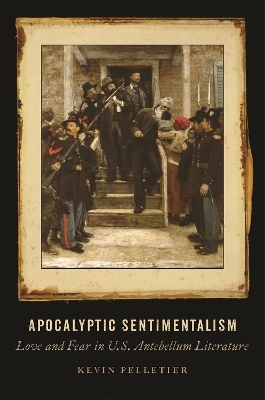
Apocalyptic Sentimentalism
Love and Fear in U.S. Antebellum Literature
Seiten
2018
University of Georgia Press (Verlag)
978-0-8203-5467-5 (ISBN)
University of Georgia Press (Verlag)
978-0-8203-5467-5 (ISBN)
In contrast to the prevailing scholarly consensus that understands sentimentality to be grounded on a logic of love and sympathy, Apocalyptic Sentimentalism demonstrates that in order for sentimentality to work as an antislavery engine, it needed to be linked to its seeming opposite - fear, especially the fear of God's wrath.
In contrast to the prevailing scholarly consensus that understands sentimentality to be grounded on a logic of love and sympathy, Apocalyptic Sentimentalism demonstrates that in order for sentimentality to work as an antislavery engine, it needed to be linked to its seeming opposite—fear, especially the fear of God's wrath. Most antislavery reformers recognized that calls for love and sympathy or the representation of suffering slaves would not lead an audience to ""feel right"" or to actively oppose slavery. The threat of God's apocalyptic vengeance—and the terror that this threat inspired—functioned within the tradition of abolitionist sentimentality as a necessary goad for sympathy and love. Fear, then, was at the center of nineteenth-century sentimental strategies for inciting antislavery reform, bolstering love when love faltered, and operating as a powerful mechanism for establishing interracial sympathy. Depictions of God's apocalyptic vengeance constituted the most efficient strategy for antislavery writers to generate a sense of terror in their audience.
Focusing on a range of important antislavery figures, including David Walker, Nat Turner, Maria Stewart, Harriet Beecher Stowe, and John Brown, Apocalyptic Sentimentalism illustrates how antislavery discourse worked to redefine violence and vengeance as the ultimate expression (rather than denial) of love and sympathy. At the same time, these warnings of apocalyptic retribution enabled antislavery writers to express, albeit indirectly, fantasies of brutal violence against slaveholders. What began as a sentimental strategy quickly became an incendiary gesture, with antislavery reformers envisioning the complete annihilation of slaveholders and defenders of slavery.
In contrast to the prevailing scholarly consensus that understands sentimentality to be grounded on a logic of love and sympathy, Apocalyptic Sentimentalism demonstrates that in order for sentimentality to work as an antislavery engine, it needed to be linked to its seeming opposite—fear, especially the fear of God's wrath. Most antislavery reformers recognized that calls for love and sympathy or the representation of suffering slaves would not lead an audience to ""feel right"" or to actively oppose slavery. The threat of God's apocalyptic vengeance—and the terror that this threat inspired—functioned within the tradition of abolitionist sentimentality as a necessary goad for sympathy and love. Fear, then, was at the center of nineteenth-century sentimental strategies for inciting antislavery reform, bolstering love when love faltered, and operating as a powerful mechanism for establishing interracial sympathy. Depictions of God's apocalyptic vengeance constituted the most efficient strategy for antislavery writers to generate a sense of terror in their audience.
Focusing on a range of important antislavery figures, including David Walker, Nat Turner, Maria Stewart, Harriet Beecher Stowe, and John Brown, Apocalyptic Sentimentalism illustrates how antislavery discourse worked to redefine violence and vengeance as the ultimate expression (rather than denial) of love and sympathy. At the same time, these warnings of apocalyptic retribution enabled antislavery writers to express, albeit indirectly, fantasies of brutal violence against slaveholders. What began as a sentimental strategy quickly became an incendiary gesture, with antislavery reformers envisioning the complete annihilation of slaveholders and defenders of slavery.
Kevin Pelletier is an associate professor of English at the University of Richmond. His work has been published in African American Review, Cultural Critique, and LIT: Literature Interpretation Theory.
| Erscheinungsdatum | 21.09.2018 |
|---|---|
| Zusatzinfo | 5 black & white photographs |
| Verlagsort | Georgia |
| Sprache | englisch |
| Maße | 152 x 229 mm |
| Gewicht | 428 g |
| Themenwelt | Geisteswissenschaften ► Geschichte ► Regional- / Ländergeschichte |
| Geisteswissenschaften ► Sprach- / Literaturwissenschaft ► Anglistik / Amerikanistik | |
| Geisteswissenschaften ► Sprach- / Literaturwissenschaft ► Literaturgeschichte | |
| Geisteswissenschaften ► Sprach- / Literaturwissenschaft ► Literaturwissenschaft | |
| ISBN-10 | 0-8203-5467-8 / 0820354678 |
| ISBN-13 | 978-0-8203-5467-5 / 9780820354675 |
| Zustand | Neuware |
| Haben Sie eine Frage zum Produkt? |
Mehr entdecken
aus dem Bereich
aus dem Bereich
Erinnerungen
Buch | Softcover (2024)
Pantheon (Verlag)
16,00 €


